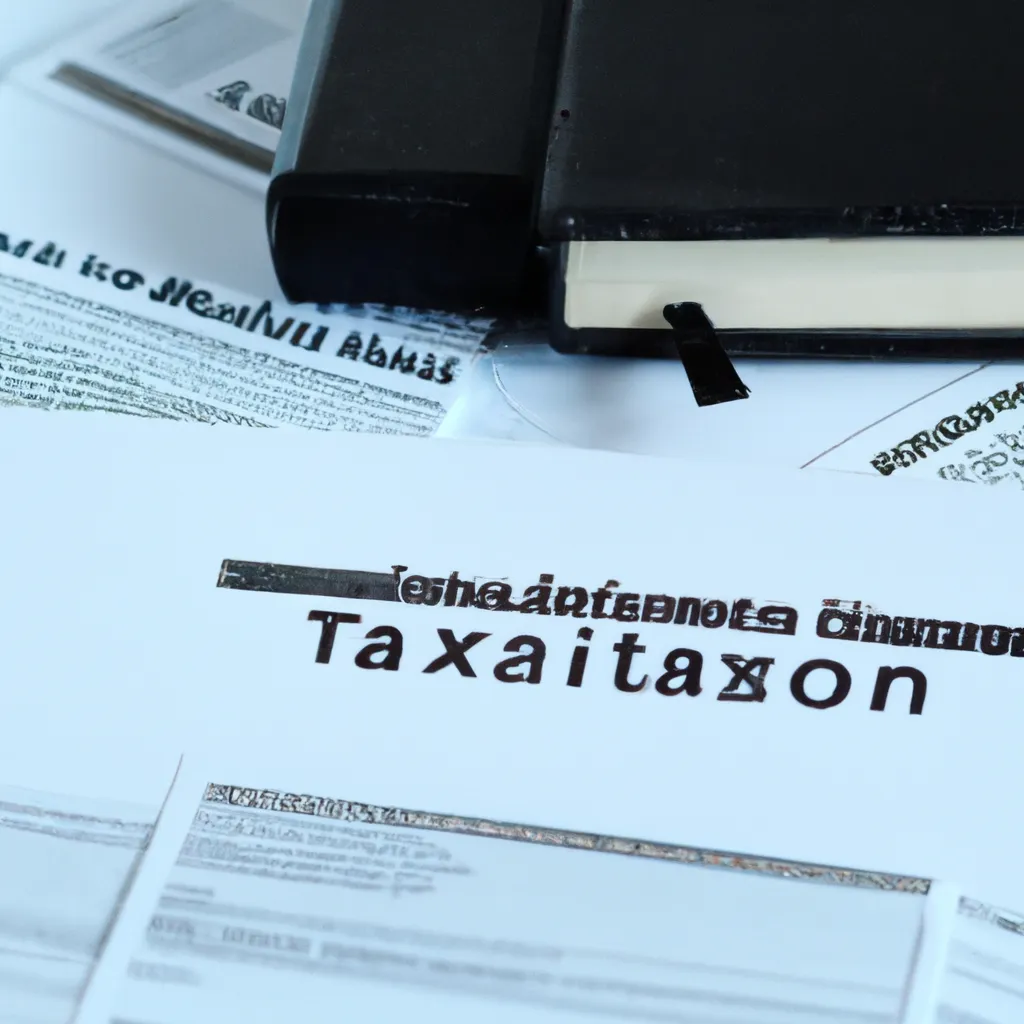Are you concerned about minimizing inheritance tax in Toronto. Look no further, as we have some expert tax advice to help you out. Inheritance tax is a major concern for many people, as it can significantly reduce the wealth they want to pass on to their loved ones. But there are ways to minimize this tax burden, and our expert tax advice can guide you through the process.
It is important to seek expert advice and plan ahead to minimize the tax burden on your heirs. Don't let inheritance tax diminish your hard-earned wealth, consult a tax expert today.

Maximizing your inheritance: how to minimize inheritance tax in toronto
Understand what inheritance tax is and how it works
Inheritance tax is a tax that is imposed on the assets or property that a person inherits from a deceased individual. In canada, inheritance tax is also known as estate tax and is only applicable if the value of the estate exceeds a certain threshold, which varies by province. In toronto, the estate tax threshold is $5.49 million, which means that if the value of the inherited estate is equal to or less than this amount, then no inheritance tax is owed.
To calculate the inheritance tax owed on an estate, the fair market value of the assets is determined and then the applicable tax rate is applied. In toronto, the inheritance tax rate ranges from 8% to 24%, depending on the value of the estate. This means that the larger the estate, the higher the tax rate and the more inheritance tax that is owed.
It's important to note that inheritance tax is different from probate fees, which are paid to the court when an estate is being administered. Probate fees are calculated based on the value of the estate and the type of assets included, and they are typically higher than inheritance tax rates.
Why it’s important to minimize inheritance tax
Minimizing inheritance tax is important for several reasons. Firstly, it allows you to maximize the amount of wealth that is passed on to your loved ones. By reducing the amount of inheritance tax owed, more of the estate can be distributed to beneficiaries, providing them with a larger inheritance.
Secondly, minimizing inheritance tax can also help to preserve family businesses and assets. Transferring these assets to the next generation without incurring high taxes can ensure the longevity of the business and allow beneficiaries to continue reaping the financial benefits of family assets.
Finally, minimizing inheritance tax can also help to mitigate any potential disputes between family members. By properly planning and minimizing the tax burden on the estate, families can avoid disagreements and maintain family harmony in the long run.
Expert tax advice for minimizing inheritance tax
When it comes to minimizing inheritance tax, it's important to seek advice from tax specialists or tax advisors. These professionals can help you to navigate the complexities of inheritance tax laws and provide valuable insights on how to minimize the tax burden on your estate.
One of the most effective ways to minimize inheritance tax is through gifting. By gifting assets to your loved ones while you are still alive, you can reduce the value of your estate and, therefore, lower the inheritance tax owed. Another strategy is to establish a trust, which can be used to transfer assets to beneficiaries while also providing tax benefits.
Tax specialists can also advise on other tax planning strategies such as setting up an estate freeze, which can help to reduce capital gains tax and ultimately minimize the inheritance tax paid. They can also ensure that you are taking full advantage of any available deductions and exemptions to reduce your tax liability.
Inheritance tax is an important consideration for anyone who will be inheriting assets or is planning to pass down their wealth to future generations. By understanding how this tax works and seeking expert advice, it is possible to minimize the inheritance tax owed and maximize the inheritance received by your loved ones.

The different types of inheritance tax specialists
Inheritance tax can be a complicated and daunting subject for many people, which is why hiring a specialist in this area can be incredibly beneficial. There are various types of tax specialists out there, each with their own unique skills and expertise. In this section, we will explore the different types of inheritance tax specialists and how they can assist you in navigating this complex area of tax law.
Cpas: what they do and how they can help you with inheritance tax
A certified public accountant (cpa) is a tax professional who has passed the cpa exam and is licensed to practice accounting. They have extensive knowledge in tax laws and can assist individuals and businesses with various tax matters, including inheritance tax.
Cpas can help you with inheritance tax in several ways. They can advise you on how to minimize the tax burden on your beneficiaries by creating a tax plan that takes into account all applicable tax laws and deductions. They will also help you keep accurate records and file tax returns on time to avoid any penalties or audits.
When it comes to inheritance tax, a cpa can also act as a liaison between you and the tax authorities. They can communicate with the tax authorities on your behalf and represent you in case of any inquiries or disputes.
If you live in toronto and are dealing with inheritance tax, hiring a cpa can be a smart decision. Not only will they have knowledge of local tax laws, but they will also be familiar with any tax credits or exemptions that may be available in your area.
Chartered accountants: the benefits of hiring a specialist for inheritance tax
Similar to cpas, chartered accountants also have extensive knowledge in tax laws and can assist individuals and businesses with various tax matters, including inheritance tax. However, unlike cpas, chartered accountants must adhere to strict ethical standards set by their professional organization.
One of the main benefits of hiring a chartered accountant for inheritance tax is their expertise in financial planning. They can provide a comprehensive overview of your financial situation and help you create a long-term tax plan that ensures your assets are protected and properly passed on to your beneficiaries.
In addition to this, chartered accountants can also offer specialized advice on complex inheritance tax situations, such as trusts and estate planning. They can guide you towards structuring your assets in a way that minimizes tax liability and maximizes benefits for your beneficiaries.
Tax advisors: how they can guide you towards minimizing inheritance tax
Tax advisors are professionals who provide specialized tax advice and planning services to individuals and businesses. They have a deep understanding of tax laws and can help you navigate complex tax situations, such as inheritance tax.
One of the main ways tax advisors can assist you with inheritance tax is by analyzing your financial situation and providing personalized tax strategies. They will take into account your specific circumstances and goals and create a plan that minimizes your tax liability while maximizing benefits for your heirs.
Furthermore, tax advisors can also offer guidance on tax-saving opportunities, such as charitable donations or gifting strategies. They can help you determine the best ways to allocate your assets to reduce the overall tax burden on your estate.
When it comes to dealing with inheritance tax, it is crucial to seek the help of a qualified tax specialist. Whether you choose to work with a cpa, chartered accountant, or tax advisor, their expertise and guidance can save you time, stress, and money in the long run. So, if you are facing an inheritance tax situation, consider consulting with one of these professionals to ensure your assets are protected and passed on according to your wishes.

Strategies for minimizing inheritance tax
Inheritance tax can be a significant financial burden for families and beneficiaries, but there are strategies that can help minimize the impact. In this section, we will discuss some key strategies for reducing inheritance tax and maximizing exemptions and deductions, using trusts and estate planning tools, and handling foreign assets and taxes.
Maximizing exemptions and deductions for inheritance tax
The first step in minimizing inheritance tax is to understand the exemptions and deductions that are available. In toronto, there is a lifetime exemption of $5 million for inheritance tax, meaning that the first $5 million of a person's estate is not subject to tax. This exemption can be claimed by each individual, so a married couple could potentially pass down $10 million without incurring any tax.
In addition to the lifetime exemption, there are also specific deductions that can be applied to reduce the taxable value of an estate. For example, any outstanding debts of the deceased can be deducted from the estate's value before inheritance tax is applied. This includes mortgages, loans, and other debts. It is essential to ensure that these deductions are properly documented and claimed to reduce the tax burden on the beneficiaries.
Another way to maximize deductions for inheritance tax is to carefully plan and manage any charitable donations made by the deceased. Charitable donations can also be deducted from the value of the estate, resulting in a lower tax bill for the beneficiaries. However, it is essential to consult with a tax specialist or advisor to ensure that these donations are structured correctly and can be effectively used as deductions for inheritance tax.
Using trusts and other estate planning tools to lower inheritance tax
Trusts can be a valuable tool for minimizing inheritance tax. By placing assets in a trust, they can be removed from the estate's value and reduce the tax burden for beneficiaries. There are various types of trusts available, including living trusts, testamentary trusts, and irrevocable trusts, each with their unique benefits and limitations. It is crucial to work with a tax specialist or advisor to determine the most suitable type of trust for your specific situation.
In addition to trusts, there are other estate planning tools that can help minimize inheritance tax. One such tool is gifting. By transferring assets to beneficiaries before death, individuals can reduce the value of their estate and therefore the inheritance tax that will be applied. However, gifting should be done carefully, as there are potential tax implications, and individuals should consult with a tax specialist or advisor before making any significant gifts.
Estate planning also allows for strategic asset allocation to reduce the taxable value of an estate. By diversifying assets and taking advantage of tax-efficient investments, individuals can reduce the impact of inheritance tax on their estate. Again, working with a tax specialist or advisor is crucial to ensure that these strategies are implemented correctly and have the desired effect.
How to handle foreign assets and taxes in your inheritance
With today's increasingly globalized world, it is not uncommon for individuals to have assets in multiple countries. When these individuals pass away, it can be complicated to deal with foreign assets and taxes in the inheritance. However, it is essential to handle these assets carefully to avoid any potential tax issues.
The first step in handling foreign assets is to determine whether they are subject to inheritance tax in their respective countries. Some countries, such as canada and the united states, have tax treaties that may provide tax relief or exemptions for foreign assets. It is crucial to consult with a tax specialist or advisor familiar with international tax laws to determine the best course of action for handling these assets.
In some cases, it may be beneficial to establish a trust to hold these foreign assets. This can help minimize inheritance tax and simplify the transfer of these assets to beneficiaries. It is essential to work with a tax specialist or advisor who is knowledgeable about trusts and international tax laws to ensure that this is done correctly.
In summary, minimizing inheritance tax involves careful planning and strategic use of available exemptions, deductions, and estate planning tools. Whether it is maximizing deductions, utilizing trusts, or handling foreign assets, it is crucial to work with tax specialists or advisors to develop a personalized strategy that will minimize the tax burden on your estate. By implementing these strategies, you can ensure that your legacy is passed down to your loved ones without being significantly impacted by inheritance tax.
Common mistakes to avoid when trying to minimize inheritance tax
In toronto, inheritance tax can often become a daunting topic for individuals and families to navigate. As with any tax, it's important to understand the laws and regulations surrounding it in order to avoid costly mistakes. In this section, we will discuss the most common mistakes people make when attempting to minimize inheritance tax.
Failing to file properly: the consequences of not understanding inheritance tax laws
One of the biggest mistakes individuals make when it comes to inheritance tax is failing to file properly. Inheritance tax laws can be complex and constantly changing, which is why it's crucial to have a strong understanding of them. Failure to properly file can result in penalties, interest, or even an audit from the canada revenue agency.
Inheritance tax laws vary depending on the province or territory in which the deceased individual lived. In toronto, for example, there are specific tax rates and exemptions that must be considered. Additionally, the type of property being inherited and the relationship between the deceased and the beneficiary can also affect the amount of tax owed. Without understanding these laws, it's easy to make mistakes when filing, which can result in owing more tax than necessary.
To avoid the consequences of not understanding inheritance tax laws, it's important to consult with a tax specialist or advisor. These professionals have a deep understanding of the tax laws and can ensure that all necessary forms and paperwork are filed correctly. They can also provide advice on any available tax credits or deductions that can help minimize the tax owed.
Overlooking available tax credits and deductions for inheritance tax
Another common mistake when it comes to minimizing inheritance tax is overlooking available tax credits and deductions. The canadian tax system offers a variety of credits and deductions that can help reduce the tax burden for individuals inheriting property. However, many people are not aware of these options and end up paying more than they need to in taxes.
For example, one common credit is the inheritance tax credit, which can be applied to offset any tax payable on the estate. This credit can be claimed by the deceased's estate or by the beneficiary who is receiving the inheritance. In toronto, this credit is available for estates worth up to $1.2 million, with a maximum credit of $60,000.
In addition to credits, there are also deductions that can be taken advantage of. For instance, certain expenses related to the estate, such as those incurred during the probate process, can be deducted from the inheritance tax owed. Again, consulting with a tax specialist or advisor can help ensure that all available credits and deductions are utilized.
Ignoring tax planning: why it’s important to consider inheritance tax from the beginning
Tax planning is an essential aspect of managing one's finances, and this is especially true when it comes to minimizing inheritance tax. Ignoring tax planning and waiting until the last minute can result in missed opportunities to minimize the tax owed. It's important to consider inheritance tax from the beginning in order to develop an effective strategy for minimizing it.
There are various tax planning techniques that can be utilized, such as gifting assets or setting up a trust. However, these strategies require careful planning and implementation. They also have specific rules and regulations that must be followed in order to be effective. Without proper planning, individuals may miss out on these opportunities to lower their inheritance tax.
Consulting with a tax specialist or advisor from the early stages of inheritance planning can help individuals develop a successful tax strategy. They can assess one's financial situation and provide advice on the best options for minimizing inheritance tax. By considering inheritance tax from the beginning, individuals can have peace of mind and avoid any costly mistakes.
Failing to file properly, overlooking available tax credits and deductions, and ignoring tax planning are common mistakes that can lead to individuals paying more than they need to in inheritance tax. By understanding the laws, consulting with a tax specialist or advisor, and properly planning, individuals can minimize their inheritance tax burden. Avoiding these mistakes can lead to a smoother and more financially sound inheritance process.
Finding the right inheritance tax specialist for your needs
Inheritance tax, also known as estate tax, is a tax imposed on the property and assets inherited from a deceased individual. In toronto, the provincial estate tax rate ranges from 10% to 20%, depending on the value of the estate. As an heir, navigating through the complex world of inheritance tax can be overwhelming and time-consuming. That's where hiring an inheritance tax specialist comes in. These professionals are well-versed in the tax laws and can help you minimize your tax liability while handling all the paperwork and legal matters related to inheritance tax. However, with several tax specialists and advisors in the market, it can be challenging to find the right one for your needs. Here are some essential factors to consider when looking for an inheritance tax specialist in toronto.
What to look for in an inheritance tax specialist
Before hiring an inheritance tax specialist, it is crucial to do your research and make an informed decision. Here are some things to look for when choosing an inheritance tax professional.
1. Specialization in inheritance tax:
An inheritance tax specialist should have expertise in the field of inheritance tax and estate planning. They should have a deep understanding of the tax laws and be up-to-date with any changes or updates. This will ensure that they can provide accurate and effective advice for your specific situation.
2. Experience:
It is essential to consider the experience of the tax specialist before hiring them. This includes not only their overall experience but also their experience dealing with cases similar to yours. An experienced inheritance tax specialist will have a better understanding of the complexities involved and can help you navigate through them more smoothly.
3. Reputation:
Research the reputation of the inheritance tax specialist or firm you are considering. Look for online reviews, ask for referrals, and check their track record. A reputable specialist will have positive reviews and satisfied clients, indicating their expertise and reliability.
4. Fee structure:
Before hiring an inheritance tax specialist, it is crucial to understand their fee structure. Some may charge a flat fee, while others may charge an hourly rate. Make sure to discuss this beforehand to avoid any misunderstandings or surprises.
Questions to ask before hiring an inheritance tax professional
To ensure you are making the right decision, here are some questions to ask before hiring an inheritance tax specialist in toronto.
1. What is your experience in dealing with inheritance tax cases?
This will give you an idea of their expertise and how well-equipped they are to handle your case.
2. Can you provide references or testimonials from previous clients?
References and testimonials are important to gauge the reputation and reliability of the specialist.
3. What is your fee structure, and are there any additional costs i should be aware of?
Make sure you understand the costs involved and any potential additional expenses.
4. How do you stay updated with the changes in tax laws?
An inheritance tax specialist should continuously stay informed about any changes or updates in tax laws to provide accurate advice.
5. Can you explain your strategy for minimizing my inheritance tax liability?
It is crucial to understand the approach the specialist will take to minimize your tax liability and ensure you are comfortable with their strategy.
The benefits of hiring a specialized inheritance tax firm
While you can seek guidance from a general tax advisor, hiring a specialized inheritance tax firm offers several benefits, including:
1. Expertise:
Specialized inheritance tax firms have in-depth knowledge and expertise in the field, ensuring they can provide the most effective advice for your specific situation.
2. Comprehensive planning:
Inheritance tax firms not only handle the tax aspects but also offer comprehensive estate planning services to protect your assets and minimize your tax liability in the long run.
3. Time and stress management:
Handling inheritance tax can be overwhelming, and by hiring a specialized firm, you can save time and reduce stress as they navigate through the complex tax laws and manage all the legalities on your behalf.
4. Long-term benefits:
A specialized inheritance tax firm can help you plan and protect your assets for future generations, ensuring you can pass them on smoothly without any tax-related complications.
Hiring a specialized inheritance tax professional can provide valuable guidance and assistance in minimizing your tax liability and protecting your inherited assets. Consider the factors mentioned above when choosing the right inheritance tax specialist for your needs in toronto.

